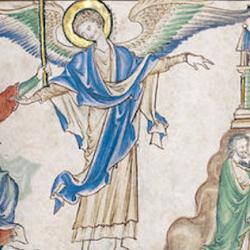With the second trumpet, a burning mountain is thrown into the city, turning a third of it to blood and killing a third of the sea creatures (Revelation 8:8-9).
A mountain tossed into the sea is a neat picture of Israel, the holy mountain, being absorbed into the Gentile world. But that doesn’t seem to be the precise picture here. Two verses hardly seem adequate to speak of the fall of Jerusalem, especially if that is the whole point of the book of Revelation. The description of that fall later takes up two lengthy and detailed chapters (17-18). It might be argued that 8:8-9 foreshadow that event, but why would the climactic event of the book be foreshadowed in a couple of verses tucked into a sequence and followed by much more horrifying judgments?
One clue is the fact that the mountain is burning; the other clue is that the first four trumpets are clearly linked to the plagues of Egypt. The burning mountain is specifically Sinai, the place where Torah was delivered. The second trumpet discloses that the mountain of Torah-bound Judaism has been tossed into the sea of Gentiles, and that the effect is to turn the sea bloody and to kill many of the Gentile sea creatures. Instead of blessing the nations, Israel has been a plague: “The name of God is blasphemed among the Gentiles because of you” is the way Paul puts it (Romans 2).










